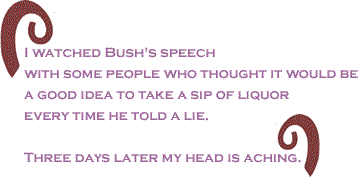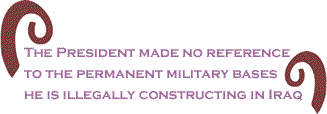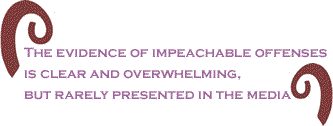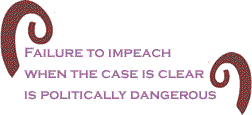
|
|||||||||||||||||||||
 |
|||||||||||||||||||||
 |
|||||||||||||||||||||
 |
|||||||||||||||||||||
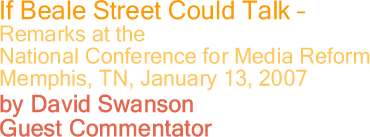 |
|
|
Part 1 Bush's Escalation Speech I'd like to request that nobody shout during this event, and I'll tell you why. I watched Bush's speech with some people who thought it would be a good idea to take a sip of liquor every time he told a lie. Three days later my head is aching. But it aches mostly because of the media's coverage of the speech. Idiots don't offend me as much as smart people following idiots do. The Washington Post printed Bush's speech for those who missed it, and then printed some analysis of it. But the analysis was provided by the White House, which published a glossy brochure that so-called reporters could plagiarize. If you went to online sources like Foreign Policy in Focus, you found analyses of Bush's speech that pointed out the lies. If you turned on your television, you heard how smart Bush was to admit his mistakes. But you did not hear the long list of mistakes that he has not admitted to or gone to prison for. You just heard about his mistake of not having yet done exactly what he now wants to do. The following is what I would like to have heard on the TV and radio after Bush's speech (and similar reporting on Congressman Dick Durbin's so-called response): Earlier this evening we aired a speech by President George W. Bush that may have left you with some false impressions. We need to correct these matters of fact. The President's speech did not mention WMDs or Saddam Hussein or attempt to explain why we are occupying the nation of Iraq or what it would mean for that occupation to "win" or "lose." This may have left you with the impression that no justification is required by law to forcibly occupy someone else's country and kill a significant portion of their population. That is not the case.
The President made no reference to the permanent military bases he is illegally constructing in Iraq. This may have left you with the impression that he plans to leave Iraq some day. This, combined with his references to democracy, may have given you a certain idea of his plans for Iraq that does not seem to be suggested by the President's actions. Bush also expressed support for a number of Middle-Eastern nations allied with the United States, notably Saudi Arabia. This may have given you the idea that these nations are democracies. They are dictatorships. Bush began his speech by connecting Iraq to 9-11. In fact, Iraq had nothing to do with 9-11. We apologize to the millions who have lost loved ones because of this lie. When Bush said that al Qaeda was "still" active in Iraq, he failed to add that it had only become active in Iraq as a result of his invasion and occupation of that nation. Bush said that he would see that the people of Iraq profit from its oil. This statement bears no relationship to actual U.S. policy, and Bush has no legal right to decide what happens to another nation's resources. Bush suggested that most Iraqis want the occupation to continue. This is false. Bush suggested that occupying Iraq was making Americans safer. His own intelligence analysts disagree. Bush implied that he can escalate wars at his own discretion. In fact, Congress can prevent him from doing so if it chooses to. Of course, Bush has escalated this war in the past. We have not reported on that as such because he did not make a big deal of it. The reason he is making a big deal of it this time was not addressed in his speech.
What was new in the speech was a threat to Iran and Syria. Bush claimed that Iran is providing material to Iraqi resisters. There is no evidence of this. Bush said he was sending ships and missile defense systems to the region. These steps have no clear connection to Iraq and may be seen as part of a threat to Iran. Bush said not one word about all of the Iraqi blood he has spilled. Approximately 655,000 Iraqis have died as a result of the United States' invasion and occupation of Iraq, thus far. And the death rate is increasing, not diminishing. Here is video showing many of the people killed and injured in this war and their family members…. …Americans can support or oppose this war by contacting their Congress Members. There will be a march in opposition to the war in Washington D.C. on January 27th followed by lobbying of Congress on the 29th. For more on that, see unitedforpeace.org Part 2 Impeach Disney and General Electric By any serious standard of journalism, impeachment should be in the news right now. This illustrates the worst problem with our media. It's not how they cover stories. It's how they do not cover stories. A Newsweek poll a while back said that 51 percent of Americans want Bush impeached and 44 percent do not. That's about double the support there was for impeaching Clinton when it was in the news every single day. Dozens of cities have passed resolutions for impeachment. State legislatures have introduced the same. One outgoing congresswoman introduced articles of impeachment in December. Dozens of scholars have written books advocating for impeachment. There are DVDs, forums, marches, rallies, protests. A week ago, we packed a huge ballroom for an impeachment forum, and to make it easy, it was the ballroom in the National Press Club. The media couldn't make the elevator trip to be there.
And of course, the evidence of impeachable offenses is clear and overwhelming, but rarely presented in the media. The number one reason that Congress members and their staff tell you in private that they are not yet impeaching is fear of the media. The number two reason is fear of Nancy Pelosi. The number one reason that well-meaning citizens tell you they don't want impeachment consists of a PR strategy. People want to present an image that does not include what the corporate media says impeachment is. It is a long journey to move from seeing this as smart and strategic to seeing it as a self-defeating surrender to the corporate media. And the independent media isn't where it needs to be either. In part, this is because it tends to retell corporate stories in a more honest way, rather than telling stories that have been untold. It is a relatively short journey to see failure to demand impeachment as a moral failure. If we go into the next presidency with the next president free to launch wars on the basis of lies, torture, murder, detain without charge, spy without warrant, rewrite laws with signing statements, hide the workings of our government, disobey laws on his or her whim . . . I don't care what party he or she is from, I don't care if it's Nelson Mandela, you don't give that power to a human being. And that's what we're doing if we fail to impeach Bush and Cheney. Impeachment is too important to stop for consideration of elections, but if you do, and if you read John Nichol's book, you realize that impeachment is not politically dangerous. Failure to impeach when the case is clear is politically dangerous. History shows this, and you can ask John.
Impeachment does not conflict with other agenda items, such as ending the war or raising wages. Watch the video of Daniel Ellsberg from January 4th. It was only the threat of impeachment that led Nixon to not veto the bill cutting off funds for the war. And it was only the peace movement that made impeachment happen. Progressive movements help each other. We are not in competition. There are a lot of great spokespeople for impeachment. The Mayor of Salt Lake City today called for the impeachment of Bush and Cheney. I wouldn't hold my breath until you see him on Meet the Press. Liz Holtzman and I have been on a few shows. We were on Hannity and Colmes. But Hannity attacked us and Colmes basically sided with Hannity. The media should be talking to all sorts of voices for impeachment and against it. Rather than demanding that Congress Members swear they won't do it (an oath, by the way, that's based on a common understanding that the grounds for impeachment exist but should be ignored) – rather than doing that, the media should do what Sam Husseini did last night when he asked Congressman Dennis Kucinich why he has yet to introduce articles of impeachment. It's not the same question, and it matters which one is asked. If our media were serious and substantive and covered the evidence and the issues, then reporters would be unable to avoid asking Why not? rather than Will you swear you won't? So, what can we do? Go to afterdowningstreet.org and get involved in urging pollsters to poll on impeachment, writing letters to editors, calling talk shows, calling producers, and protesting at media outlets. Create a short video of yourself with your name, Congressional district, and why you want impeachment. Post it at Youtube. Learn more at afterdowningstreet.org. Plan to organize a protest at your local newspaper or television station in March. Learn more at www.fair.org. With enough pressure from us on the media and Congress, plus impeachment being sent from state legislatures, plus investigations underway in Congress, and the ongoing and worsening war, we will get to impeachment. But our window of opportunity to get this up and rolling is the next few months. This is an urgent demand for media activism. Put impeachment on the table and the airwaves! David Swanson is the Washington Director of Democrats.com and of ImpeachPAC.org. He is co-founder of the AfterDowningStreet.org coalition, creator of MeetWithCindy.org, and a board member of Progressive Democrats of America, and of the Backbone Campaign. He was the organizer in 2006 of Camp Democracy. He serves on the steering committee of the Charlottesville Center for Peace and Justice and on a working group of United for Peace and Justice. His website is www.davidswanson.org. |
|
| Home | |
| January 18, 2007 Issue 213 |
||||||||||||||
|
||||||||||||||
| Printer Friendly Version in resizeable plain text format | ||||||||||||||
 |
||||||||||||||
|
||||||||||||||
 |
||||||||||||||
 |
||||||||||||||
 |
||||||||||||||
 |
||||||||||||||
| |
||||||||||||||
| |
||||||||||||||





















